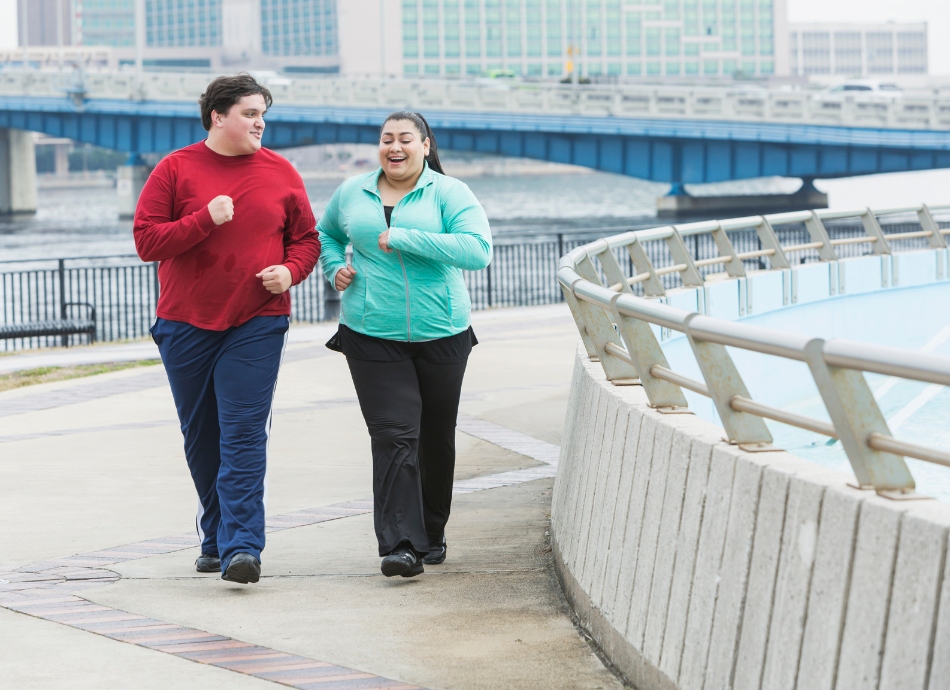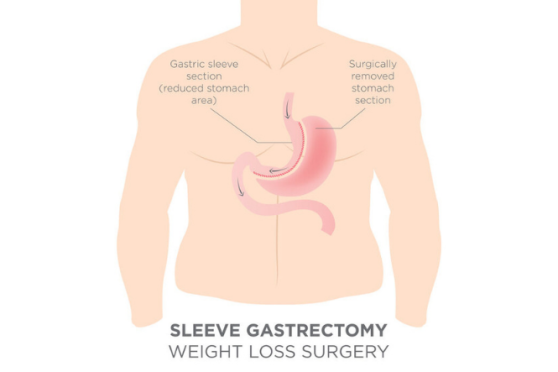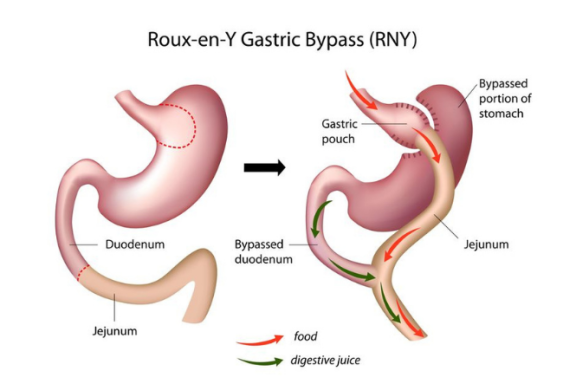If you're a frequent visitor to Healthify, why not share our site with a friend? Don't forget you can also browse Healthify without using your phone data.
Weight loss surgery
Also called bariatric or metabolic surgery
Key points about weight loss surgery
- Weight loss surgery (bariatric or metabolic surgery) is a way of losing weight for people who are seriously overweight, committed to losing weight and have failed to lose weight using conventional approaches.
- The surgery can lead to significant weight loss and can help improve many obesity-related conditions, such as type 2 diabetes or high blood pressure.
- But it's a major operation and generally should only be considered after trying to lose weight through a healthy diet and exercise.
- After surgery, a healthy diet and exercise is important for maintaining weight loss.

You may be eligible for the surgery if you meet certain criteria. This includes if:
- you have a high body mass index (BMI) and an obesity-related condition that might improve if you lost weight, eg, type 2 diabetes or high blood pressure. BMI criteria vary but are often between 35 and 70
- you've tried all other weight loss methods, such as dieting and exercise, but have struggled to lose weight or keep it off
- you understand the serious changes surgery will make to your life
- you agree to long-term follow-up after surgery – such as making healthy lifestyle changes, taking long term multivitamins and attending regular check-ups.
Smoking or vaping may mean surgery isn't safe for you. Your healthcare provider will be able to talk to you about the criteria in more detail. They can also talk to you about whether weight loss surgery is the right option for you. Although the success rate for most weight loss surgery is high, make sure you understand the risks and what to expect before and afterwards.
Weight loss surgery can change the way your body absorbs medicines which will affect the dose or type of medicine you need to take. Learn more about weight loss surgery and medicines.
There are several different types of weight loss surgery. These are the 3 most common types in Aotearoa New Zealand:
Sleeve gastrectomy. This surgery removes the outer three-quarters of your stomach so it’s much smaller than it was before. The rest of the stomach is shaped into a long gastric tube or ‘sleeve’. This means you cannot eat as much as you could before surgery and you'll feel full sooner.
Roux-en-Y gastric bypass. A gastric bypass is where a small pouch is made at the top of your stomach. The pouch is then connected to your small intestine, missing out (bypassing) the rest of the stomach. This means it takes less food to make you feel full and you'll absorb fewer calories from the food you eat.
One anastomosis gastric bypass. This is similar to the Roux-en-Y bypass but requires only 1 not 2 joins of the bowel. This means you eat less and absorb fewer calories.

Image credit: Canva
Surgery on its own does not lead to long lasting weight loss. It is only an opportunity/tool for you to change eating habits, increase daily physical activity and commit to lifelong follow up.
There can be problems, even a long time after the operation. Problems may be related to:
- The surgery itself, depending on the procedure, eg, leaking from a staple line/join, stricture, reflux or hernia. Another operation may be needed.
- Missing vital vitamins and minerals. Supplements may need to be taken for the rest of your life to prevent this. Eating a good diet is also helpful.
- The major change you’ve had. Your body image and the way other people relate to you can take quite a lot of adjusting to.
The success of any obesity surgery requires you to take responsibility for your eating and exercise patterns. You need to regularly monitor your weight and attend your follow up appointments as part of achieving your goal and staying healthy.
Here are our top tips for getting the most from your weight loss surgery.
1. Make lifelong diet changes
It’s important to follow a healthy diet after your surgery. You will need to cut out high calorie, low nutrient foods such as sweets and soft drinks and limit highly processed foods, eg, pies, sausages, biscuits and chips. Instead, you’ll need to eat foods that are high in protein, like eggs, milk, fish and nuts and eat plenty of fruits and vegetables.
You will need to eat smaller qualities of food and chew your food slowly. Do not drink while eating (but drink sufficiently between meals). Stop eating as soon as you no longer have the feeling of being hungry (fullness).
Alcohol is high in calories so you’ll also need to cut down on the amount of alcohol you drink.
2. Make a habit of exercising regularly
Exercising may feel difficult at first because obesity puts a lot of strain on your body. Regular exercise is vital for maintaining a healthy weight post-surgery and it also plays a big part in your mental wellbeing. Find an exercise you enjoy, join a class or fitness club, or find a walking buddy. Set some fitness goals and make a commitment to achieving these. Start slowly and build up. Record your progress so you can see how you improve over time.
3. Have a good support network
People may react differently to your weight loss and you might get comments about your body that you’re not used to. Make sure you have someone who understands, to talk to and support you on your journey – whether it’s a friend, family member or a health professional.
4. Think about any underlying issues that contributed to your weight gain
There are many physical and psychological issues that contribute to weight gain, and many of the triggers that caused you to gain weight will still be present after your surgery. Again, consider talking to someone who can help you readjust.
5. Monitor your medications
Losing weight can affect the amount and type of medications you take. Make sure your specialist and GP know which medications you’re taking, and let them know about any new side effects.
To find a weight loss surgery service within your area, use the location filter under the map (mobile view) or at the bottom of the search results (computer view).
Source: HealthPoint services directory used with permission.
Weight loss surgery(external link) NHS, UK
Weight loss surgery(external link) Capital & Coast DHB
Life after weight loss surgery(external link) NHS, UK
Brochures
Apps/tools
Digestive health apps
Nutrition, exercise and weight management apps
BMI calculator
References
- Clinical guidelines for weight management in NZ adults(external link) Ministry of Health, NZ, 2017
- Obesity related publications(external link) Ministry of Health, NZ
- Bariatric–metabolic surgery – a guide for the primary care physician(external link) Australian Family Physician
- Weight loss – the options and the evidence(external link) BPAC NZ, 2019
- Life after weight loss surgery(external link) NHS, UK, 2020
- Weight loss surgery(external link) Capital & Coast DHB, NZ
- Lee PC, Dixon J. Bariatric–metabolic Surgery – a guide for the primary care physician(external link) Aust Fam Phys. 2017;46(7):465-471.
Weight loss – the options and the evidence(external link) BPAC NZ, 2019
Auckland weightloss surgery(external link) HealthPoint & Auckland DHB, NZ
Clinical guidelines for weight management in NZ adults(external link) Ministry of Health, NZ
Lee PC, Dixon J. Bariatric–metabolic surgery – a guide for the primary care physician.(external link) AFP 2017;46:465–71
Obesity and systems thinking with Professor Boyd Swinburn
(The GP Show, 2019)
Apps
Digestive health apps
Nutrition, exercise and weight management apps
Credits: Healthify editorial team. Healthify is brought to you by Health Navigator Charitable Trust.
Reviewed by: Dr Andrew MacCormick, Associate Professor/Upper GI and Bariatric Surgeon Waipapa Taumata Rau (University of Auckland)/Counties Manukau District Health Board
Last reviewed:
Page last updated:






